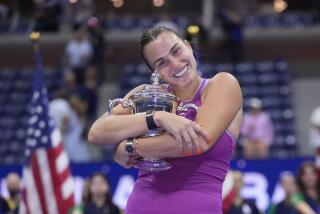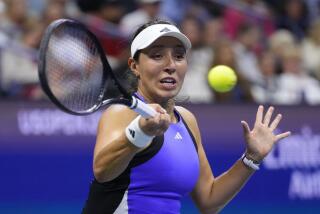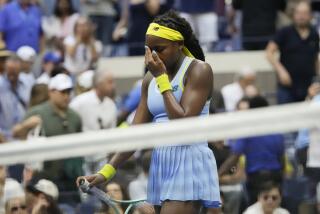Graf the One Constant at Open : Tennis: She makes it to the women’s final for the fifth time in seven years and will face Sukova.
- Share via
NEW YORK — In a U.S. Open that has become known for its rain delays and upsets--as well as those novel player complaints about bad scheduling and bad spaghetti--it’s probably comforting that there is still something you can depend on.
That would be Steffi Graf in the final.
Graf wore down Manuela Maleeva-Fragniere to score a 4-6, 6-1, 6-0 victory as darkness fell on the women’s semifinals Friday night, and is now one victory away from her third Grand Slam singles title of the year.
To mark the occasion of her fifth U.S. Open final in seven years, Graf is lucky enough to be running across one of her favorite punching bags.
It is Helena Sukova, a 6-7 (9-7), 7-5, 6-2 winner over Arantxa Sanchez Vicario in the other semifinal. Sukova will thus lug to the final her 1-19 record against Graf.
Graf hasn’t lost to Sukova in more than 10 years, when Graf was a 14-year-old amateur.
At least Graf knows what to look for.
“I just expect a match where she gives me no rhythm at all,” Graf said. “High (balls), low, come in, stay back, slow, fast, everything.”
After the first set, everything went wrong for Maleeva-Fragniere. She said it was too windy for her to be effective because she had to hit the ball harder than normal and didn’t feel up to it.
Evidentally not. Maleeva-Fragniere had 44 unforced errors and only 15 winners.
Graf didn’t really have to be that sharp, mainly because Maleeva-Fragniere lost the second and third sets in a total of 52 minutes.
“I just couldn’t get going,” Graf said. “I was not kind of ready for the match, so I was surprised.”
Graf’s sore left knee, which she bruised when she struck it with her racket last week, was taped once again and it seemed to affect her serve. She had no aces and three double faults.
Sore knee or not, Graf is likely to outrace Sukova. Crosstown traffic moves faster than Sukova, who nevertheless lumbered to the net a whopping 122 times and won 79 points with her slow-motion aggression.
It’s been more than four years since Sukova made a Grand Slam final. Graf beat her, 6-4, 6-4, in the 1989 Australian Open.
Since then, Sukova has sort of hung around, never making much of an impact except for pulling off an occasional upset to earn the reputation of spoiler, not champion.
For example, in the fourth round, Sukova wasn’t supposed to beat Martina Navratilova, but she did. In the semifinal, she wasn’t supposed to beat Sanchez Vicario, but she did.
“And I am not going to be the favorite one for tomorrow,” she said. “Why should I (care)? It has been like that most of my playing years on the tour, so it is like I am used to that.”
The No. 12-seeded Sukova is the lowest-seeded women’s finalist since 1978, when Pam Shriver, who was seeded No. 16, lost to Chris Evert in straight sets.
So the big question is, what in the world is Sukova doing in the final?
“Self-confidence,” said Sukova, who identified an improvement in her resolve as the main reason for turning around her game.
Actually, Sukova needed every bit of self-confidence she could muster after serving for the first set at 5-4 and blowing it, then blowing a 5-1 lead in the tiebreaker.
Sukova turned the match around during an awkwardly played second set marked most by the 17 break points up for grabs for both players. Sukova had nine break points and made three of them, but still had a chance to end it a lot earlier. She held three set points and missed them all with Sanchez Vicario serving at 4-5.
“I was mad at myself,” Sukova said. “I have been on the tour a long time (and) this has happened to me before and you just have to live with it.”
This is what Sanchez Vicario must do. She played just poorly enough to lose a match in which there were a total of 33 break-point chances and both players had more unforced errors than winners.
Sanchez Vicario was philosophical afterward: “I think that tomorrow is going to be another day.”
Notes
Rick Leach and Ken Flach, who have won six Grand Slam doubles titles with other partners, won their first as a team, defeating Martin Damm and Karel Novacek of the Czech Republic, 6-7 (7-3), 6-4, 6-2, in the final. Leach had won three Grand Slam titles with Jim Pugh and Flach had won three with Robert Seguso. Said Flach: “I still feel like the Olympics was probably my finest moment, but you know I haven’t won this tournament for eight years, haven’t been to the final of a Grand Slam for four years, so this confirmed to me the fact that I am still capable of playing at a top level.” Leach said winning the U.S. Open for the first time felt just as good as when he won Wimbledon and the Davis Cup final with Pugh.
Flach and Leach offered support for John McEnroe to replace Tom Gorman as Davis Cup captain. “John has matured a lot as a person and there is nobody that knows more about on-court strategy, which is probably the one thing that we have lacked in a captain over the years,” Flach said. “There has been the generation gap between the player on the court and captain. Now John can bridge that gap.” Flach said the USTA would be “foolish” not to select McEnroe. . . . Damm was supposed to get married Friday in Prague, but he had to play for the doubles title instead. The wedding was put off until today, but Damm is not coming home empty-handed. He and partner Novacek split $100,000. Flach and Leach split $200,000.
* MEN’S SEMIFINALS
Top-seeded Pete Sampras and Cedric Pioline appear to have clear sailing to the final. C11
More to Read
Go beyond the scoreboard
Get the latest on L.A.'s teams in the daily Sports Report newsletter.
You may occasionally receive promotional content from the Los Angeles Times.










